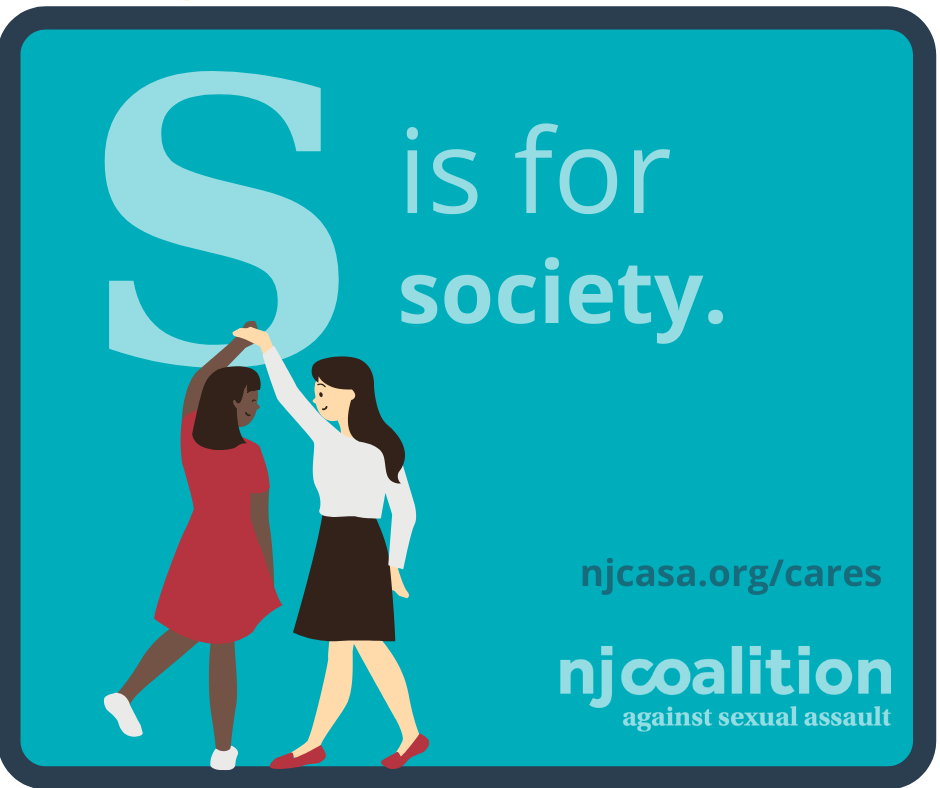Throughout our NJCASA C.A.R.E.S. journey, we have reimagined what healthier and more inclusive communities would look like. We’ve discussed principles of autonomy, reflection, and empathy, and considered how practicing those in our day-to-day lives can help decrease the risk of sexual violence. And now, we are bringing it all together to talk about society.
Our society is dictated by social norms – that is, beliefs about what is widely considered to be appropriate. Social norms provide unwritten guidelines for how people are expected to behave and act in our society.

Some social norms– like holding the door open for a person walking behind you or saying “thank you” after someone helps you —are positive. But social norms can also be harmful. For example, for years it was customary for women to not work outside the home. While today women’s participation in the workforce continues to be on the rise, deep pay inequity still persists as a result.
These same social norms permit and promote sexual violence. Research shows social norms that support male superiority and sexual entitlement and maintain women’s inferiority and sexual submissiveness are risk factors for sexual violence.
These social norms can seem difficult to challenge or change because they so deeply influence our society. But we can start the hard work of shifting norms and preventing sexual violence in our communities by practicing the principles of autonomy, reflection, and empathy in our day-to-day lives.
Looking back on our C.A.R.E.S. journey, we can imagine what a society that prioritizes protecting against sexual harm would look like:
- Autonomy is not just respected – it’s prioritized. That means every person has the freedom to set their own personal boundaries. It means each person’s full gender identity and expression is accepted by community members and does not result in discrimination in healthcare, housing, or education. A society that fully prioritizes autonomy would begin infusing principles of consent into sexual health education for our young people, making it a foundational building block of our school’s sex ed programming.
- Reflection takes place at home, in our schools and workplaces, and in society at large. A society that prioritizes reflection recognizes that past norms have been incredibly harmful, and seeks to rectify the harms caused by them – for example, removing monuments of people who were oppressive, abusive, racist, and sexist. A society that prioritizes reflection also makes a financial investment to harm, such as making an investment to end the gender- and race-based pay gap by raising the minimum wage and paying reparations to those who were harmed directly or their descendants. This society would also invest in large-scale restorative justice programming, to allow for individual- and community-level accountability for harm outside of the legal system.
- Empathy would flow through every aspect of this society. A fully empathetic society would have an economic system that perpetuates shared prosperity among all citizens, rather than a concentration of wealth with a select few. An empathetic society would eliminate barriers to voting that specifically inhibit people of color and people with disabilities. The society would recognize that quality healthcare is an innate right of all humans, not a privilege to be paid for – we know that survivors of sexual violence often have disparate health impacts as a result of victimization, making equal access to healthcare critical.
Sexual violence is 100% preventable. A society that values connected communities, autonomy for all, reflection on one’s actions, and empathy for others is one where sexual violence is less likely to occur. Such a society is possible, if each of us begin taking the steps today to build it.
* NJCASA recognizes that gender is a spectrum and that there are more than two genders. The use of gender-specific pronouns and language is not intended to exclude or assign an identity. We include this language to reflect what has been captured by researchers and practitioners, fully acknowledging it may be limiting.
This blog is part of the NJCASA C.A.R.E.S. initiative.
Sharing is caring! Review our sharing policy.
